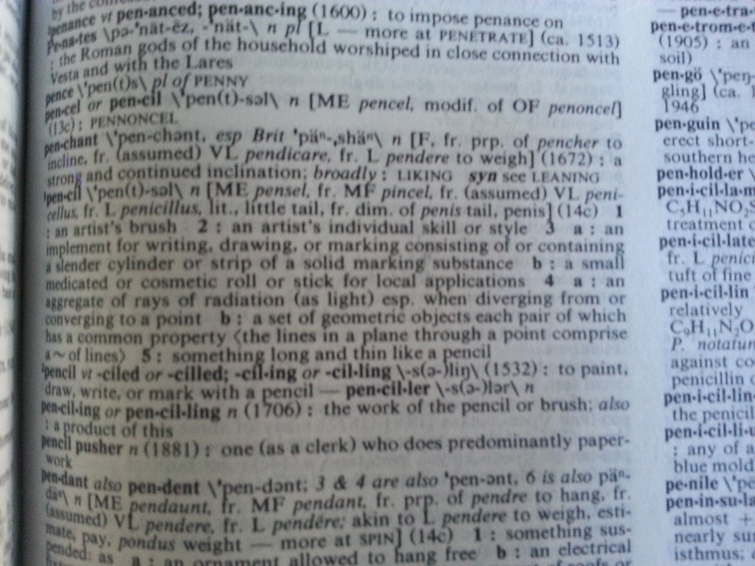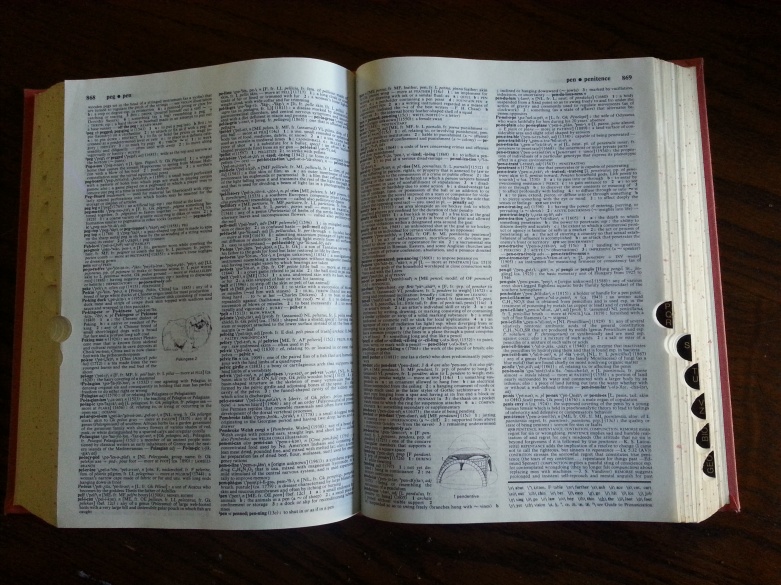In response to The Daily Post’s writing prompt: “Dictionary, Shmictionary.”
I have always loved language. When I would go to the bathroom as a kid, I would grab the closest reading material to the toilet, usually a spray can of cleaning chemicals, and try to decipher the complex words. Directions that came in boxes of microwaves and video cameras were my chance to try to learn Spanish, German, French, or whatever language was written in the alphabet I know and love. All I had to do was compare sentences in those languages to the ones in English. I read before kindergarten, and haven’t stopped. I have even been known to thumb through the dictionary when bored.
So imagine the thrill of taking a linguistics course at my university, a course universally hated by the majority of the students, a course that involved anything from creating syntax trees to translating Klingon. My professor, who also loved language, seemed confused by the blank stares she received when she would ask the class a question. Students would complain after class. They were ill-prepared by an education system that has systematically removed the teaching of language structure. They were starting at ground zero. I was from another generation. I vividly remember parsing sentences in my fifth grade class. Mrs King was my teacher, and I, the normally shy student, would thrust my hand in the air, Hermione Granger style, in the hopes of being chosen to come to the board and show off my knowledge.
At some point during my time in this linguistics, I rediscovered my love of the dictionary. Sure, like every other college student, I had a copy of the dictionary sitting on my shelf at home, but it was a small, useful, paperback copy, dog-eared from my previous stint in college many years ago.
One of our assignments was to study etymology, or the origins of words. You probably won’t be surprised to know that I find this fascinating; history meets language. I became reacquainted with the big Webster’s Collegiate Dictionary, the one with the indents for the letters. (Also something I loved as a kid.) I found one at a garage sale and eagerly bought it, anxious to take it home and share my knowledge with my own children.
I decided that I would take a word they were familiar with and show them the history. Now, I am a teacher. I know that I should run through a lesson before teaching the class, but in my excitement to share this knowledge with my kids, including two sons who were in 3rd and 4th grade, I skipped this step. Quickly running down a mental list of familiar objects, and with school being in session at the time, I concluded that pencil would be a great word to start with.
I asked them if they had ever wondered how things got their names. I grabbed a pencil and told them we were going to look it up in the dictionary. I explained that words change through time, but we can look back and see what changes they have undergone and where the word originated. So we looked.
Pencil… from Middle English pensel…from Middle French pinsel … from (assumed) vulgar Latin penicellus …from Latin penicillus … literal meaning little tail … from diminutive of … penis?

As you can see, the lesson quickly became an awkward lesson in how many things referred back to male genitalia. With a sheepish mom and a couple of giggling boys, the lesson quickly concluded, and I don’t think they have ever had the urge to look up the history of a word again. As for me, I endured months of jokes about pencils from my kids, whose idea of language, and of pencils, has forever been altered.



Hilarious 🙂 As the mother of three rather smart-alecky boy of my own, I can well imagine all the thinly-disguised pencil jokes.
LikeLiked by 1 person
You are the third person whose tale (tail?) has a similarity to mine for this prompt! There is definitely a motif running through this prompt.
LikeLiked by 1 person